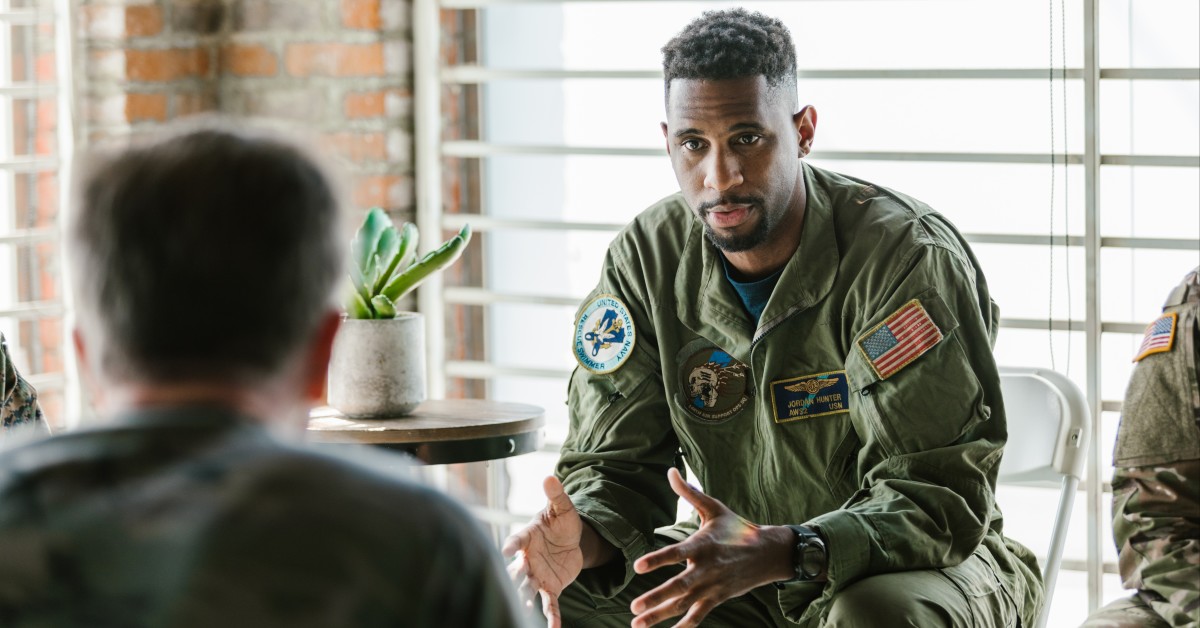
How to Become a Computer and Information Systems Manager
Computer and information systems managers are enjoying explosive job demand. [...]

You’ve dedicated years of hard work and discipline to rise through the ranks as a military officer. A master’s degree could be the next strategic step to become a highly effective leader, hone your expertise, and gain that competitive edge for a promotion.
Going back to school may not sound like an easy—or even practical—feat as an active duty military member. Thankfully, the U.S. military has developed a range of education benefits to get you started.
In 2016, former Defense Secretary Ash Carter unveiled the Force of the Future initiative focused on recruitment, retention, and education. Among its benefits, the plan expanded tuition assistance and access to relevant master’s programs.
Whether you’re an officer in the Navy, Army, Marines, National Guard, Coast Guard, or Air Force, you could qualify to attend a fully funded master’s degree program that fits your schedule.
In this article, we’ll answer a few pressing questions and outline the 9 best master’s degrees for military officers based on your career path. We’ll discuss:
The U.S. military rewards mastery, whether you have a background in homeland security, healthcare, or even data science. And since a bachelor’s degree was already required to receive a commission, you’re in the right position for this next step. Here are some top reasons for military officers to earn a master’s degree.
In many circumstances, earning a graduate degree is the key to advancing through the ranks and receiving special assignments. Even if higher education isn’t technically required on paper, the greater depth of knowledge puts you ahead of the pack for these unique promotions.
Military members can also choose a specific focus, such as in social work, engineering, or cybersecurity. These graduate programs offer more niche opportunities either while serving or when returning to civilian life.
An experienced military officer influences the impact and effectiveness of the armed forces. A breadth of knowledge across sociopolitical issues, public policy, and military history makes officers stronger and well-informed leaders.
Even if you focused on specific course work in your undergrad, ROTC, or Officer Candidate School, a master’s degree gets you up to speed on today’s modern technology, policies, and leadership strategies.
While you may not receive a raise merely for earning a master’s degree, the opportunities that open up with advanced education can lead to more lucrative opportunities.
In addition to military base pay, which correlates with years of service, both active duty and reserve service members can increase their salaries. Special duties, titles, and short-term assignments are prioritized for those with unique military training and education. Enlistment bonuses are also common for trained officers who stay on longer to fill specific roles.
For example, the Army offers enlistment bonuses for positions like geospatial engineers, joint fire support specialists, and healthcare professionals. A master’s degree allows career military officers to explore facets of their service while increasing their income.
Let’s explore a few of the most popular degree programs for military personnel, particularly those who serve as officers.
| University and Program Name | Learn More |
|
Boston College:
Master of Science in Applied Analytics
|
|
|
Merrimack College:
Master of Science in Data Science
|
|
|
Virginia Commonwealth University:
Online Master of Social Work
|
Financial managers, logistics officers, and business management analysts all keep the regiment running smoothly. Both active duty military officers or those looking to transition back to a civilian career can enhance their organizational, financial, and decision-making skills by earning an MBA.
Flexible programs, such as the one offered by Howard University, offer both in-person or online degrees for domestic and international students. Relevant coursework may include topics like:
Like many similar graduate schools, Howard offers both a part-time and accelerated option, ideal for active-duty students.
If you’re debating whether an MBA is worth it, consider how military experience and a business background go hand-in-hand. MBA curricula cover everything from analyzing data to team management, all of which go back to the core of military leadership.
In this data-driven age, national security isn’t just about advanced weaponry and well-trained fighters. Protecting classified information is essential to securing the homeland. Officers with a background in information technology or programming can earn higher-paying and highly specialized assignments with an MS in Cybersecurity.
These master’s programs typically take about four years to complete (on a part-time basis), requiring between 30 and 36 credits. For this reason, flexible online courses are essential for active military personnel. A well-rounded program should focus on both the technology and the policy behind data protection.
Real-world problem-solving and lab work are key in an area with such a constantly changing set of challenges. The University of Tulsa, for example, balances both traditional course work and virtual labs while connecting students with a collaborative online community.
Interpreting and translating data is crucial both on the battlefield and for tactical teams. A Master of Data Science puts you in the position to look at the wave of daily data inundating your team and translate it into concrete strategy.
Data science programs train students to collaborate and explore practical challenges. Consider the University of Virginia’s Online Data Science program, for example. The program is fully online, takes about two years to complete, and combines independent, asynchronous learning with real-world assignments.
Another top STEM-focused university, Stevens Institute of Technology, offers online access to some of the top mathematicians in the world and can be completed over five terms.
An MSDS curriculum focuses on both technical training and real-world applications, covering:
Since a master’s in data science program covers a range of industries, you’ll have training relevant for military service and your post-military career. While serving, you’ll have access to positions like Navy intelligence specialist or Air Force cyber systems operation expert. For newly commissioned officers, these roles may offer enlistment bonuses.
Engineers have their pick of specialized roles in the military, from architectural and mechanical engineering to civil and environmental positions. A master’s of engineering provides a leg up for these assignments. Officer positions put you in charge of large-scale projects, training a team, and strategizing for the future.
Since engineering programs are typically quite hands-on, it’s best to work with a distance program familiar with supporting the armed forces in particular. North Carolina State University earns top rankings both for its online Master in Engineering curriculum and military and veteran services.
Programs like this offer full degree programs, certificates, and individual courses to stay up-to-date on the top developments in engineering. Most master’s in engineering programs require 30 credits hours, which online students can complete over a period of up to six years. Choose from specialties like:
There is no shortage of opportunities in health administrative roles across the military, both on land and at sea. And with access to military financial aid, officers can advance their careers without incurring a hefty bill.
Health admin responsibilities run the gamut, including coordinating the medical safety of the troops, hiring and training new personnel, and maintaining a balanced budget. In short, there are highly specialized roles within health administration that fit each skill set. Officers can work one-on-one with soldiers in a clinic or focus on operations research with their data analysis skills.
Keep your eye out for a few critical features in a military-friendly Master of Health Administration program:
The NYU Master of Health Administration program hits all the key points. In addition to the factors listed above, the program also welcomes students for a two-and-a-half-day immersion in New York City.
Military students across the board often align with the relatively new development of the Master of Homeland Security and Emergency Management. The degree combines a passion for:
Choose a program tailored to your unique skills and career goals. For example, the University of Tulsa was named by the DHS as a partnering research institute in 2020. The school’s MS in Cybersecurity provides hands-on, fully remote programming focused on the data side of national protection.
Additionally, Virginia Commonwealth University offers the country’s first Master’s in Homeland Security and Emergency Preparedness (HSEP). The flexible curriculum can be completed in about two years. Its curriculum includes weekly live sessions and a final capstone project based on a real-world scenario.
What’s more, the DHS encourages both student veterans and military spouses to apply for roles after transitioning from service. Their training and background clearance often make them ideal leaders across the department.
A great leader draws inspiration from the leaders who came before them. A Master in Military History is ideal for the career officer looking to hone their management and strategic skills by studying past military challenges and triumphs.
Many programs, including the one at The Citadel Military Colleges of South Carolina, combine a MA in Military History with a Graduate Certificate in Military Leadership. This approach blends the historical curriculum with concrete management tactics for today’s military. The online degrees run simultaneously over about two years, culminating in a thesis or non-thesis capstone project.
Graduates may be recruited for tactical roles in specialized forces, as surface warfare officers or as intelligence analysts, just to name a few. Each of these positions typically offers retention or special assignment bonuses. The Naval ROTC notes that surface warfare officers can obtain up to $50,000 in bonuses for the promotion.
Enrollment in a master’s or doctoral program for social work is a popular choice for military officers, and for good reason. After all, you’ve already chosen a life dedicated to keeping your fellow citizens safe, and their voices heard.
An MSW opens the doors to jobs with the Department of Veterans Affairs as well as in public and private sector positions. As a military social worker, you’ll have the skills to support and guide your fellow veterans through the challenging transition back to civilian life.
Social workers also:
An online MSW program provides the best flexibility while still serving as an officer, but social work requires in-the-field experience more than other concentrations.
Tulane’s online MSW, for example, requires as much as 1,000 hour of fieldwork to earn the degree. Here, you can pair your MSW with an MS in Disaster Resilience Leadership or move on to a doctoral program.
Few programs are as finely tailored to career military officers as the Master of Strategic Security Studies. The strict qualifications make this a competitive program for experienced military officers with a minimum of a bachelor’s degree from an accredited institution.
The National Defense University’s MASSS program run 10 months, covering topics like:
The rigorous curriculum requires a balance of hands-on practice and independent research as well as a final thesis. Upon completion, the highly recognized degree provides the experience to better lead in today’s quickly changing military environment.
Special assignments across the military often require specialized skills, and the military understands this. It offers several funding opportunities for active-duty officers and military veterans.
Active-duty officers in the Army—as well as those in voluntary indefinite status—can apply to have their master’s degree fully funded. The ACS program is ideal for officers who can demonstrate a need for the training for an upcoming assignment.
The program is competitive. High undergrad GPA, GMAT scores, and potential benefits of the degree all play a role in funding approval.
While we commonly associate the GI Bill with veteran assistance, the comprehensive program provides education benefits for both active duty military and veterans as well as their family members.
The GI bill offers several options to cover graduate degrees:
In addition to the standard programs listed above, some military organizations also offer specific scholarships, typically in the legal and medical fields. For those with loans from previous degrees, federal Perkins Loan forgiveness may also be available after a set period of active duty.
A strong graduate education fortifies your leadership skills, both in the military and in your life as a civilian. Most importantly, you don’t need to go it alone. Select a school that celebrates your next step as a military officer and take advantage of the range of programs that want to get you there.
(Updated March 20, 2024)
Questions or feedback? Email editor@noodle.com

Computer and information systems managers are enjoying explosive job demand. [...]

A homeland security master's degree can lead to careers in [...]

A degree in homeland security can help graduates begin or [...]

Product management is a skill-based field where work experience can [...]

The 8 Keys to Success,created by the DOE, VA, and [...]
Categorized as: Cybersecurity, Data Science, Engineering, Healthcare Administration, Homeland Security, Social Work, Information Technology & Engineering